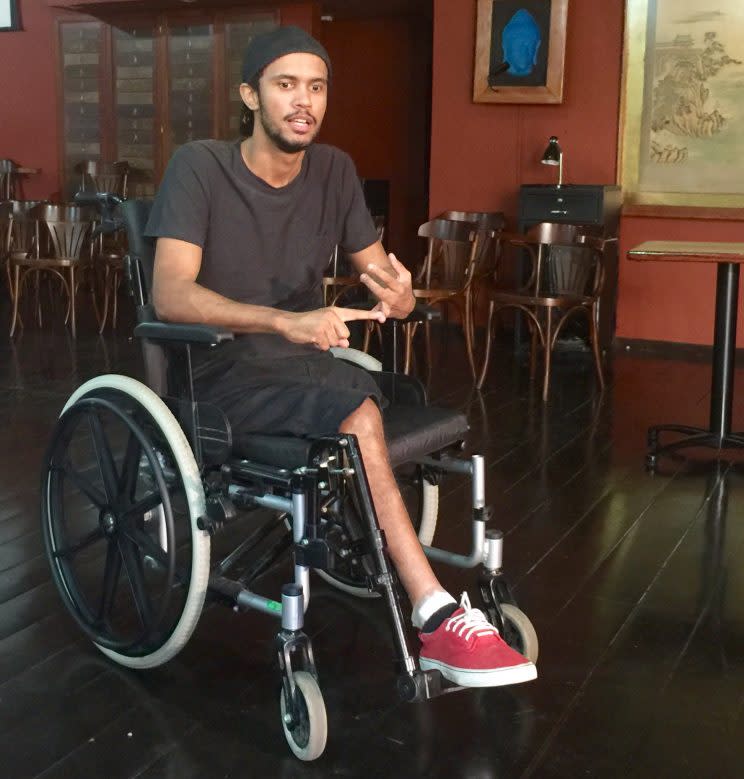Fear and death in the favelas: How the Olympics affect Rio's lower class
RIO DE JANEIRO – He still has no idea why the officers stopped him, or why he was shot.
Vitor Santiago was on his way to his home in a favela in February 2015 when soldiers waved down the car he was in and searched inside. They waved him on and then, a few minutes later, his car was peppered with a hail of bullets. The driver was hit once, Santiago twice. He fell into a coma and needed his left leg amputated. He is paralyzed from the waist down.
A year-and-a-half later, Santiago sits in a wheelchair, still in shock. Why were the soldiers even there? Why did they search? “Have you ever seen a tank?” he said Tuesday through a translator. “A real tank?”
There are more than a few tanks around this city now, and a lot of soldiers surrounding them. Some are perched along the highways, carrying assault weapons. Some are standing watch by malls and shops. As the Games begin, Rio has the feel of a police state. This is part of the Olympics apparatus in the age of terrorism, and the world’s media and athletes would justifiably howl if there was too little security in a nation with such porous borders hosting an international event. But the military, and the police, does not bring a blanket of reassurance to many who live here. Just the opposite.
“For me the most brutal element of this is investing in elite areas for elite benefits for temporary visitors, and then leaving most of the problems of the city unsolved,” said Christopher Gaffney, senior research fellow at the University of Zurich, who lived in Rio for several years.

Rio has traditionally had tension between its poorer communities and the police. Favelas have been overrun by guns and drugs for years. Yet many believe things got worse when the city hosted the first of three major international sporting events in 2007. That was the year of the Pan-American Games, and a deadly police operation in a group of favelas that became known as the “Pan Killings.” More than 902 people died in police-involved activities in that year alone.
Problems seemed to subside after 2007, but then the World Cup arrived in 2014, and along with it came a 39.4 percent spike in police-related killings that year, according to Amnesty International. The number jumped again in 2015, and Santiago feels he’s fortunate not to be among that group. Doctors said he only had a 7 percent chance of surviving.
[Adelson: Meet the fishermen of Rio’s contaminated Guanamara Bay]
The hope and plan was that the last few years would bring a new age of peace and prosperity to Rio’s slums. Police presence was upped in many favelas after the city won the Olympics in 2009 as a means of eradicating the drug trade. Yet many believe the preparation for major tourist inflows has rationalized the increase of police forces and that, in turn, has led to more conflicts in the favelas. One of the most widely-known casualties was Caio da Silva, who was shot and killed by police last year in what was later ruled an accident. His mother told the Wall Street Journal that before the pacification project, “You could walk around without fear.”
So while an expanded police force means needed security to tourists, it has the opposite connotation to many residents. Murders have risen 15 percent this year alone, and robberies have risen even more. Whatever the reason for that – and economic turmoil nationwide is likely a factor – expanded police presence hasn’t solved the problem. It has also taken a toll on the police itself, as some officers have been injured or killed in the backlash.
“[The IOC] promised a legacy of security,” said Renata Neder of Amnesty International on Tuesday. “And they have failed.”
Neder wants human-rights assessments written into the contract of every future Olympics, and independent evaluations to be a part of every build-up to the Games. Part of the problem, she feels, is that police abuse was exacerbated by the arrival of massive sporting events, and nothing was done to curb it.
“If you have a police force that kills a lot,” she said, “if you increase operations, it’s simple math. [Rio] did not learn the lesson of the Pan-American Games, and the lessons of the World Cup, and now they are committing the same mistakes they have in the past.”
So while these Games can be deemed successful if there are exciting sports storylines, limited Zika diagnoses and no terrorist attacks, the Olympics will conclude an era that many here will look back on as a major setback. Many residents of favelas were displaced in the name of venue building, and others had their lives ruined in the name of police “pacification.” No matter what glory comes to Rio from these Olympics, the damage done to individual lives from a decade of mega-events is done.
Santiago is a sad example of that. He said Tuesday he has not received any aid from the government, whether in the form of a wheelchair subsidy or even money for the diapers he’s needed to wear. The normalcy he once had is no more, taken without even an explanation.
And what was hoped to be an Olympic legacy of added trust has slipped into something much closer to fear.
More Summer Olympics coverage on Yahoo Sports:


